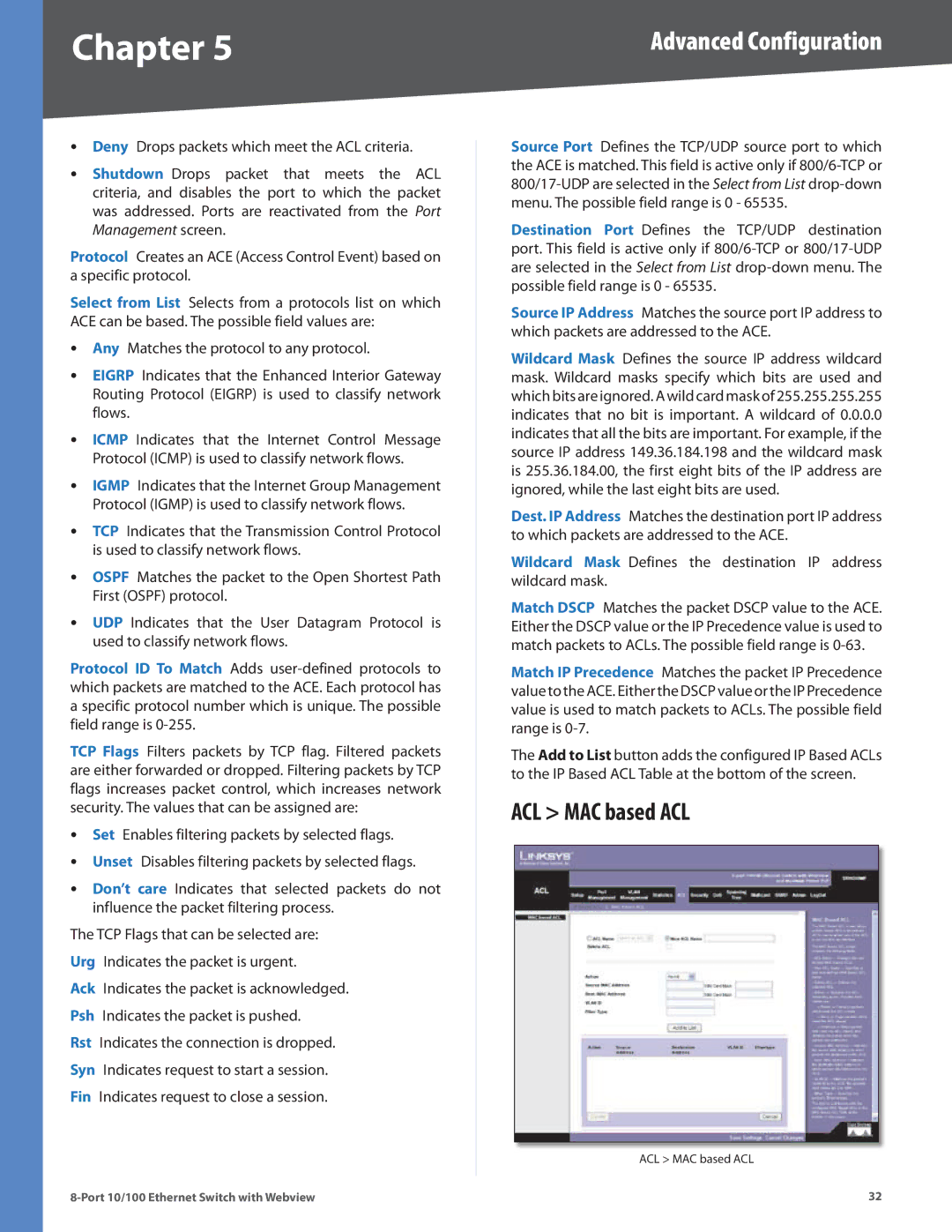
Chapter 5
•• Deny Drops packets which meet the ACL criteria.
•• Shutdown Drops packet that meets the ACL criteria, and disables the port to which the packet was addressed. Ports are reactivated from the Port Management screen.
Protocol Creates an ACE (Access Control Event) based on a specific protocol.
Select from List Selects from a protocols list on which ACE can be based. The possible field values are:
•• Any Matches the protocol to any protocol.
•• EIGRP Indicates that the Enhanced Interior Gateway Routing Protocol (EIGRP) is used to classify network flows.
•• ICMP Indicates that the Internet Control Message Protocol (ICMP) is used to classify network flows.
•• IGMP Indicates that the Internet Group Management Protocol (IGMP) is used to classify network flows.
•• TCP Indicates that the Transmission Control Protocol is used to classify network flows.
•• OSPF Matches the packet to the Open Shortest Path First (OSPF) protocol.
•• UDP Indicates that the User Datagram Protocol is used to classify network flows.
Protocol ID To Match Adds
TCP Flags Filters packets by TCP flag. Filtered packets are either forwarded or dropped. Filtering packets by TCP flags increases packet control, which increases network security. The values that can be assigned are:
•• Set Enables filtering packets by selected flags.
•• Unset Disables filtering packets by selected flags.
•• Don’t care Indicates that selected packets do not influence the packet filtering process.
The TCP Flags that can be selected are: Urg Indicates the packet is urgent.
Ack Indicates the packet is acknowledged. Psh Indicates the packet is pushed.
Rst Indicates the connection is dropped. Syn Indicates request to start a session. Fin Indicates request to close a session.
Advanced Configuration
Source Port Defines the TCP/UDP source port to which the ACE is matched. This field is active only if
Destination Port Defines the TCP/UDP destination port. This field is active only if
Source IP Address Matches the source port IP address to which packets are addressed to the ACE.
Wildcard Mask Defines the source IP address wildcard mask. Wildcard masks specify which bits are used and which bits are ignored. A wild card mask of 255.255.255.255 indicates that no bit is important. A wildcard of 0.0.0.0 indicates that all the bits are important. For example, if the source IP address 149.36.184.198 and the wildcard mask is 255.36.184.00, the first eight bits of the IP address are ignored, while the last eight bits are used.
Dest. IP Address Matches the destination port IP address to which packets are addressed to the ACE.
Wildcard Mask Defines the destination IP address wildcard mask.
Match DSCP Matches the packet DSCP value to the ACE. Either the DSCP value or the IP Precedence value is used to match packets to ACLs. The possible field range is
Match IP Precedence Matches the packet IP Precedence value to the ACE. Either the DSCP value or the IP Precedence value is used to match packets to ACLs. The possible field range is
The Add to List button adds the configured IP Based ACLs to the IP Based ACL Table at the bottom of the screen.
ACL > MAC based ACL
ACL > MAC based ACL
32
